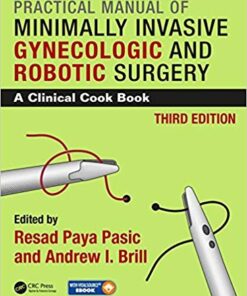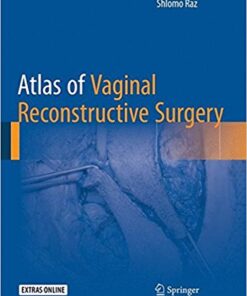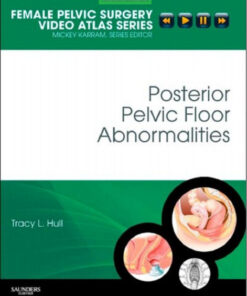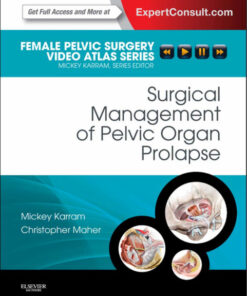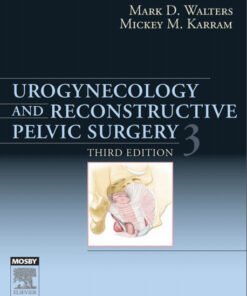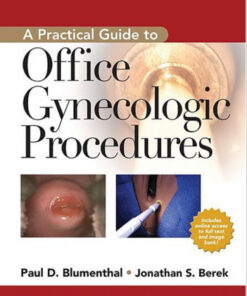The Definitive Guide to Gynecologic Surgery: A Comprehensive Resource for All Your Needs
Learn More About Gynecologic Surgery with This Book!
Are you looking to learn more about gynecologic surgery? Look no further than this book! It provides a comprehensive overview of the field, from basic anatomy and physiology to advanced surgical techniques. You’ll gain an understanding of the indications for surgery, preoperative evaluation, and postoperative care. Plus, it includes detailed illustrations and photographs to help you visualize the procedures. Get your copy today at DentalBooks.net and start learning more about gynecologic surgery!
GYNECOLOGIC SURGERY
Walters & Karram Urogynecology and Reconstructive Pelvic Surgery 5th Edition PDF
GYNECOLOGIC SURGERY
GYNECOLOGIC SURGERY
Atlas of Difficult Gynecological Surgery 1st ed. 2020 Edition PDF
GYNECOLOGIC SURGERY
GYNECOLOGIC SURGERY
Precise Neurovascular Anatomy for Radical Hysterectomy 1st ed. 2020 Edition PDF
GYNECOLOGIC SURGERY
Speroff’s Clinical Gynecologic Endocrinology and Infertility Ninth Edition PDF
GYNECOLOGIC SURGERY
Translational Advances in Gynecologic Cancers 1st Edition PDF
GYNECOLOGIC SURGERY
Pre-Menopause, Menopause and Beyond: Volume 5: Frontiers in Gynecological Endocrinology PDF
GYNECOLOGIC SURGERY
Focus on Gynecologic Malignancies (Energy Balance and Cancer) 1st ed. 2018 Edition PDF
GYNECOLOGIC SURGERY
Textbook of Gynecologic Robotic Surgery 1st ed. 2018 Edition PDF
GYNECOLOGIC SURGERY
GYNECOLOGIC SURGERY
GYNECOLOGIC SURGERY
GYNECOLOGIC SURGERY
GYNECOLOGIC SURGERY
GYNECOLOGIC SURGERY
Atlas of Vaginal Reconstructive Surgery 1st ed. 2015 EditionPDF
GYNECOLOGIC SURGERY
Operative Techniques in Gynecologic Surgery: Gynecology 1st Edition PDF
GYNECOLOGIC SURGERY
Congenital Mullerian Anomalies 2016 : Diagnosis and Management
GYNECOLOGIC SURGERY
GYNECOLOGIC SURGERY
GYNECOLOGIC SURGERY
GYNECOLOGIC SURGERY
DVD Videos Surgical Management of Pelvic Organ Prolapse: Female Pelvic Surgery Video Atlas Series 1e
GYNECOLOGIC SURGERY
GYNECOLOGIC SURGERY
GYNECOLOGIC SURGERY
Diagnostic and Operative Hysteroscopy 2nd (second) Revised Edition
GYNECOLOGIC SURGERY
A Practical Guide to Office Gynecologic Procedures 2nd ed. Edition
GYNECOLOGIC SURGERY
GYNECOLOGIC SURGERY
Introduction
This comprehensive guide to gynecologic surgery is the definitive resource for all your needs. Written by leading experts in the field, it provides detailed information on the latest techniques and technologies used in gynecologic surgery. It covers a wide range of topics, from preoperative planning to postoperative care, and includes step-by-step instructions for performing common procedures. With its clear explanations and illustrations, this book is an invaluable resource for any healthcare professional involved in gynecologic surgery.
Overview of Gynecologic Surgery: Types, Benefits, and Risks
Gynecologic surgery is a type of medical procedure that focuses on the female reproductive system. It is used to diagnose and treat various conditions, including cancer, endometriosis, fibroids, pelvic organ prolapse, and infertility. Gynecologic surgery can also be used for cosmetic purposes, such as labiaplasty or vaginoplasty.
The types of gynecologic surgery vary depending on the condition being treated. Common procedures include laparoscopy, hysteroscopy, hysterectomy, myomectomy, oophorectomy, and tubal ligation. Laparoscopy is a minimally invasive procedure that uses a thin, lighted tube to view the inside of the abdomen and pelvis. Hysteroscopy is a procedure that uses a thin, lighted telescope to view the inside of the uterus. Hysterectomy is the surgical removal of the uterus, while myomectomy is the surgical removal of uterine fibroids. Oophorectomy is the surgical removal of one or both ovaries, and tubal ligation is a permanent form of birth control that involves cutting and sealing the fallopian tubes.
The benefits of gynecologic surgery depend on the type of procedure being performed. In general, it can help to diagnose and treat various conditions, improve fertility, reduce pain and discomfort, and improve overall quality of life. For example, a hysterectomy can help to relieve symptoms of heavy menstrual bleeding, chronic pelvic pain, and endometriosis. A myomectomy can help to improve fertility by removing uterine fibroids that may be blocking the fallopian tubes.
As with any medical procedure, there are risks associated with gynecologic surgery. These include infection, bleeding, blood clots, damage to surrounding organs, and reactions to anesthesia. Additionally, some procedures, such as hysterectomy, can cause long-term side effects, such as menopausal symptoms and loss of sexual desire. It is important to discuss the potential risks and benefits of any procedure with your doctor before undergoing surgery.
Overall, gynecologic surgery is a safe and effective way to diagnose and treat various conditions related to the female reproductive system. It can help to improve fertility, reduce pain and discomfort, and improve overall quality of life. However, it is important to discuss the potential risks and benefits of any procedure with your doctor before undergoing surgery.
Preoperative Considerations for Gynecologic Surgery
Preoperative Considerations for Gynecologic Surgery are essential to ensure a successful outcome. Preoperative planning is an important part of any surgical procedure, and gynecologic surgery is no exception. It is important to consider the patient’s medical history, physical condition, and any other factors that may affect the outcome of the surgery.
The first step in preoperative planning is to obtain a thorough medical history from the patient. This includes information about any past surgeries, current medications, allergies, and any other medical conditions. The patient should also be asked about any family history of gynecologic problems or diseases. This information will help the surgeon determine the best approach for the surgery.
The next step is to perform a physical examination. This includes a pelvic exam, Pap smear, and other tests as needed. During the physical exam, the doctor will look for any signs of infection, inflammation, or other abnormalities. This information will help the surgeon decide which type of surgery is most appropriate for the patient.
Once the medical history and physical exam have been completed, the patient should be counseled on the risks and benefits of the proposed surgery. This includes discussing the potential complications, recovery time, and any lifestyle changes that may be necessary after the surgery. The patient should also be informed of any special instructions they need to follow before and after the surgery.
Finally, the patient should be given the opportunity to ask questions and express any concerns they may have. This is an important part of the preoperative process, as it allows the patient to feel more comfortable with the procedure and better understand what to expect.
Preoperative considerations for gynecologic surgery are essential to ensure a successful outcome. By taking the time to properly evaluate the patient’s medical history, physical condition, and any other factors that may affect the outcome of the surgery, the surgeon can make an informed decision about the best approach for the procedure. Additionally, by providing the patient with the opportunity to ask questions and express any concerns they may have, the patient can feel more comfortable with the procedure and better understand what to expect.
Intraoperative Techniques for Gynecologic Surgery
Postoperative Care and Recovery After Gynecologic Surgery
Postoperative care and recovery after gynecologic surgery is an important part of the overall treatment process. Gynecologic surgery can be used to treat a variety of conditions, including endometriosis, uterine fibroids, ovarian cysts, and cervical cancer. It is important for patients to understand the postoperative care and recovery process in order to ensure a successful outcome.
The first step in postoperative care and recovery is to follow the instructions provided by your doctor. This may include taking medications as prescribed, getting plenty of rest, and avoiding strenuous activities. Your doctor may also recommend that you attend physical therapy or other forms of rehabilitation to help with healing and recovery.
It is important to keep the surgical site clean and dry. You should avoid soaking in a bathtub or swimming pool until your doctor has given you permission to do so. You should also avoid sexual intercourse until your doctor has cleared you for it.
Your doctor will likely prescribe pain medication to help manage any discomfort you may experience during the recovery period. It is important to take these medications as directed and not to exceed the recommended dosage.
You may experience some bleeding or discharge from the surgical site. This is normal and should decrease over time. If the bleeding or discharge becomes excessive or if you experience any other unusual symptoms, contact your doctor immediately.
Your doctor may also recommend that you wear a special support garment to help reduce swelling and provide additional support to the surgical area. This garment should be worn as directed and should be removed only when instructed by your doctor.
It is important to follow all of your doctor’s instructions regarding postoperative care and recovery after gynecologic surgery. Doing so will help ensure a successful outcome and a speedy recovery.
Complications and Management of Gynecologic Surgery
Conclusion
The Definitive Guide to Gynecologic Surgery is an invaluable resource for any healthcare professional looking to stay up-to-date on the latest gynecologic surgical techniques. This comprehensive guide provides detailed information on a wide range of topics, from preoperative planning and postoperative care to common gynecologic procedures. With its clear explanations and helpful illustrations, this book is an essential tool for anyone interested in providing the best possible care for their patients.












